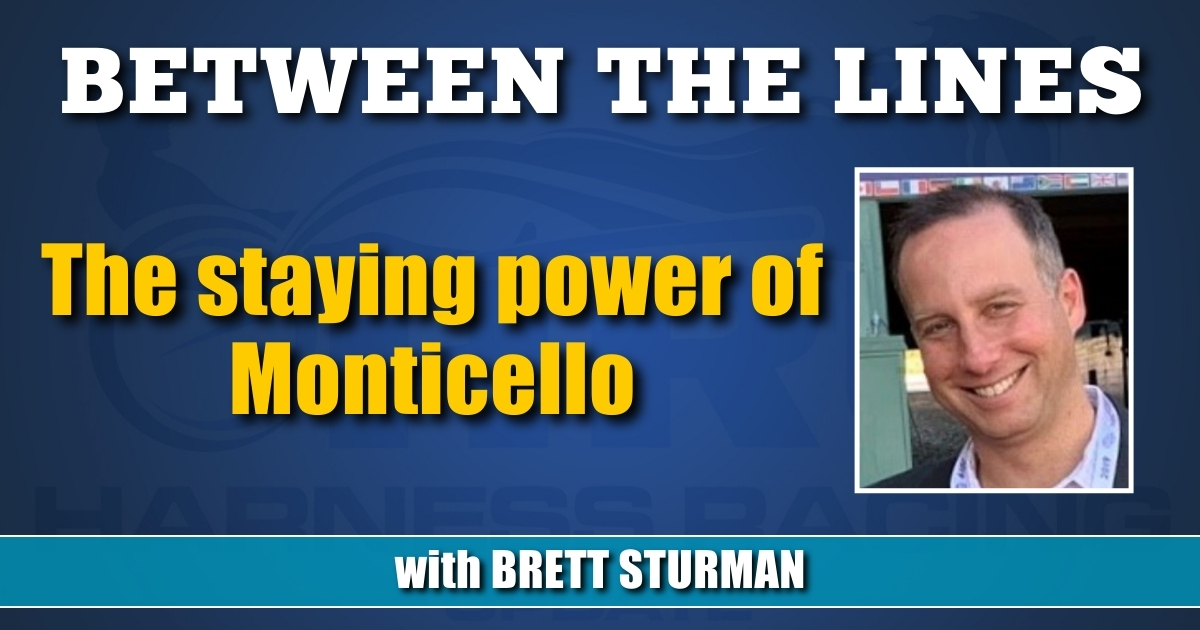The staying power of Monticello
On Thursday, the tiny track had handle of more than $1.1 million, its second highest in history.
by Brett Sturman
In the category of not entirely out of the blue but still fascinating to ponder, handle at Monticello Raceway went over $1 million this past Thursday (Feb. 1). In its press release, Monticello announced that the handle of $1,114,118 was the second highest in the track’s 66-year history.
To say that the resulting handle was a function of the high number of races on the card would be technically correct, but that alone misses the remarkably consistent handle dynamic at Monticello. The near-record card from the first day in February had 13 races, almost double than usual, to help make up for the latest track cancellation that came days earlier on Monday.
But what was not unusual was the amount wagered per-race that day of $85,701. In fact, that per-race average is nearly on the nose to the $85,019 per-race average from the prior Thursday when the track handled just over $935,000 over 11 races. Nearly every race day at Monticello has multiple races with total pools in excess of $100,000. If the track raced fewer days and went 11 or 12 races a card instead of the more general number of just eight, it would reach $1 million in handle all the time. The amounts that Monticello averages in per-race handle is not something most tracks can boast.
What makes the Monticello handle such a phenomenon is that, respectfully, there isn’t much in the product that suggests it should handle as high as it does. Its handle truly is far greater than the sum of its parts. It buries all traditional notions as to what drives handle.
If there were a performance ratio that was the result of handle to quality of racing stock, Monticello would be laps ahead of whoever would be next. Despite what was once thought to be favorable gaming conditions, purses at the track have been on the steady decline for years. On Thursday’s card, only the fillies and mares open with a purse of $6,500 went for a purse of more than $5,000. The majority of the other races that day offered purses just in the $3,000’s, including a pair of $5,000 claiming races going for $3,000 and $3,200.
That’s not something that bothers Monticello bettors, though. In the race with a $3,200 purse, total race handle was $117,644. It defies conventional wisdom.
Similarly, Monticello shows that horses don’t need to race in times of 1:48 to generate wagering interest. Especially in the winter months, races at the track still can be found going in times of over 2:00. From Nov. 13 of last year, there was a trot race that went in a time of 2:06 on a fast-rated track and it had tens of thousands of dollars wagered on it.
There’s no definitive answer, but it’s nonetheless interesting to ponder the uniqueness of Monticello that drives its consistently high handle.
Perhaps it comes down to two simple factors of appeal to its core following. First, it comes to mind as the only other track along with Freehold to offer afternoon harness racing for as long and as consistently as it has. Second, it has a long-established New York following. The fact that Monticello has retained its aging but still viable following and that it races in the afternoon — as opposed to Yonkers that races in the evening — maybe that is Monticello’s secret for success.
One would think Yonkers would gain also from the historical visibility to a New York following, but that hasn’t been the case. Maybe it’s a different dynamic when racing at night as opposed to the afternoon. But whatever the case and despite Yonkers racing some of the best horses in the country offering purses about five times over that of Monticello, the track is almost routinely outhandled by its upstate neighbor.
There’s nothing particularly flashy in the Monticello product and its style of half-mile racing is about what you’d expect from any other track of that size. But again, coming back to consistency, bettors have come to know what to expect. Many of the horsepeople at the track have been mainstays there for decades, and maybe there’s some level of comfort and predictability in that. That there’s perpetual familiarity has continued to keep the track’s dedicated following.
From research online, I’ve seen conflicting information as to what Monticello’s all-time handle is. Even Thursday’s handle of $1.1 million was cited as the second-highest handle ever, but there was that day from November with tote manipulation across the country and Monticello had one race alone with a $950,000 superfecta pool. Did that day not count? At this point, million-dollar cards at Monticello may soon be even more commonplace.
Regardless of the specific records, the trend of Monticello along with other smaller, half-mile tracks over the past few years has been an increase to handle. Batavia Downs has set a record handle two different times in its first six days of racing in 2024. Western Fair Raceway handled over $2.1 million across three race dates this past week.
There’s something to be said for the following that each track has.
















